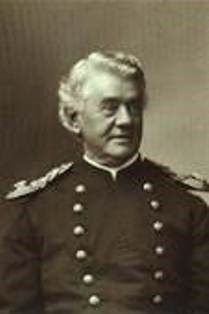
(LIBI Archives/Library) Frederick William Benteen was born on August 24, 1834. He entered military service from Missouri as first lieutenant, Company C, Missouri Volunteer Cavalry, on September 1, 1861. Benteen was actively engaged in fighting throughout the Civil War, primarily in the western theater. He rose to the rank of lieutenant colonel during the war. After the war he was appointed captain, 7th Cavalry, effective July 28, 1866. Benteen received a brevet of colonel for gallant service in the engagement on the Saline River in Kansas on August 13, 1868. Almost immediately on joining the 7th Cavalry, Benteen developed a dislike for his commanding officer, Lieutenant Colonel George Armstrong Custer. Benteen disliked Custer's showy self display. Benteen was involved in the attack on the Southern Cheyenne village at Washita in November 1868. His dislike of Custer intensified when he blamed Custer for not making a more thorough effort to locate Major Joel Elliot. Elliot had led a small force of troops down the valley chasing Cheyenne refuges from the attacked village and had never returned to the command. It was discovered later that Elliot's small force of 20 troopers had been cut off and slain by warriors responding from villages further down the valley. Benteen participated in the Black Hills Expedition in 1874 and the Sioux campaign in 1876. His part in the Battle of the Little Bighorn elicited mixed reviews. His failure to promptly come to Custer's aid as ordered was strongly criticized. However, his aid to Reno, at Reno's request, and his active leadership at the Reno-Benteen defense site mitigated such criticism. At the Little Bighorn, Benteen had been sent southwest with a battalion of three companies to determine if more Indian encampments extended to the south along the Little Bighorn River. Finding none, Benteen turned back north, encountering trumpeter John Martin (Giovanni Martini) who delivered a message from Custer's adjutant, Lieutenant W. W. Cooke, to come quick and bring the extra ammunition with the pack train. Benteen encountered Major Reno's depleted command before he reached Custer and Reno begged Benteen to stay with his force yelling that he "had lost half his men." In response to the firing heard down river, Benteen followed Captain Thomas Weir's initiative to respond to the sound of the guns. The relief stopped at the spot known today as Weir Point after moving a mile north, but were forced back by the approach of hundreds of warriors to Reno's original position where they dug in defensively. From that point on, Benteen took over the active defense for the 7th Cavalry, through the rest of that day and into the afternoon of June 26. He deployed the various companies, actively led an attack to clear warriors from his section of the perimeter and encouraged Reno to do the same in his sector. He further deployed sharpshooters to cover volunteers sent to the river to secure water. The consensus among officers and men was that Benteen saved the day at the defense site above the Little Bighorn River. Benteen was on his feet the entire time during the siege, positioning and directing the troops while distaining seeking cover. He had the boot of his heel shot off and was hit in the finger by a spent bullet. As a result of Benteen's leadership, about 350 men of the 7th Cavalry survived the siege. Benteen served in the Nez Perce campaign in 1877, including the Canyon Creek fight on September 13. He testified at the Reno Court of Inquiry in 1879 in Chicago. At the Inquiry, he interestingly stated that he did not hear the firing of Custer's battalion four miles to the north. Benteen was generally highly respected as a company commander by his men. He had a relaxed manner but brooked no insubordination. His manner and competence gained the respect of his men. He was appointed major, 9th Cavalry, effective December 17, 1882. In later years Benteen began to drink more. He was suspended from rank for one year at half pay for drunken and disorderly conduct on April 20, 1887 and was retired for disability on July 7, 1888. Unlike Reno, Benteen seemed impervious to criticism of his role at the Battle of the Little Bighorn. |
Last updated: April 23, 2025
